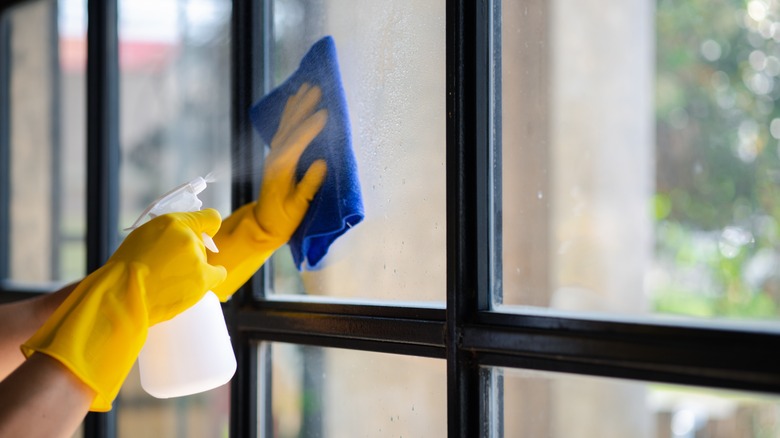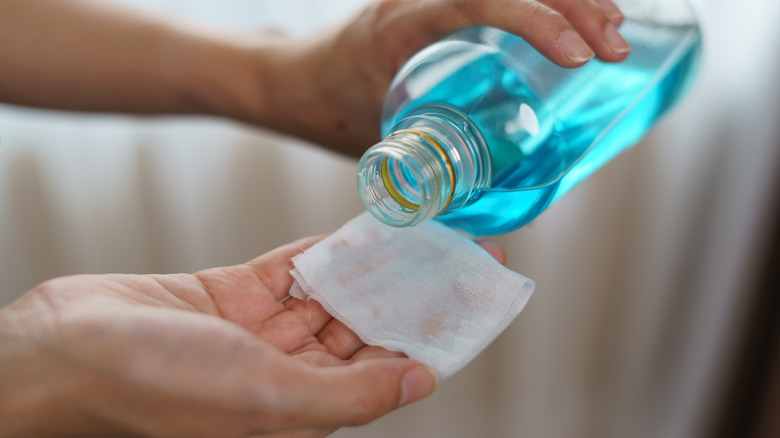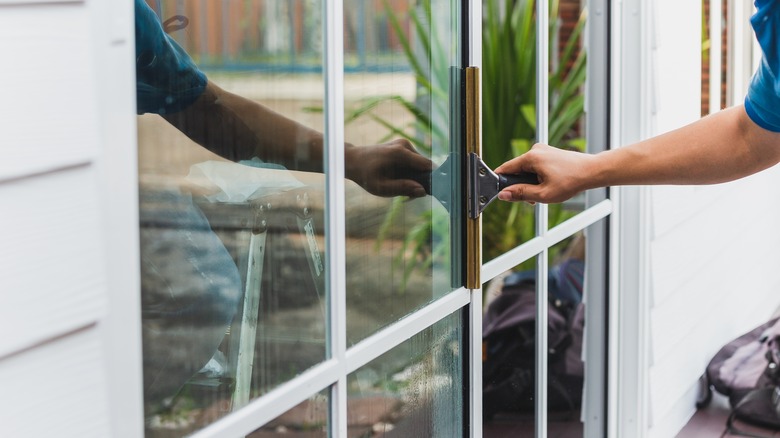The Added Benefit Of Washing Your Windows With Rubbing Alcohol
If you want to step up your window cleaning game, rubbing alcohol is a game changer. Its main component, isopropyl alcohol, breaks down a good number of non-polar substances, making it adept at tackling greasy, oily residues that water alone can't handle. This ability is particularly valuable when dealing with the everyday grime that accumulates on windows. One of the standout qualities of this alcohol is its rapid evaporation rate. When applied, it dissipates quickly, leaving behind a pristine, streak-free windows. The antiseptic nature of rubbing alcohol is another aspect not to be overlooked. As it tackles dirt and grime, it also disinfects, removing a wide range of germs and bacteria from your glass surfaces. This sanitizing effect is particularly beneficial in areas where hygiene is a priority, like kitchen windows or glass doors leading to patios and outdoor spaces.
During the colder months, rubbing alcohol's role expands beyond just cleaning. It acts as an effective de-icing agent for windows. By lowering the freezing point on the glass surface, it efficiently prevents frost formation, which is also beneficial for your car windows. This dual function of cleaning and de-icing highlights the versatility of rubbing alcohol as a multi-purpose household cleaning agent. Beyond its primary benefits, its biodegradable nature makes it environmentally-friendlier compared to many chemical cleaners. Its simple composition means less impact, making it a more responsible choice if you're eco-conscious.
The best ways to use rubbing alcohol for window cleaning
There are various ways to use rubbing alcohol on your windows. Take, for instance, the challenge of frosty winter mornings. Mix just 1 liter of water and a 1/2 cup of rubbing alcohol, and you have yourself a powerful de-icing solution. This blend is especially effective for car windows, cutting through frost quickly and leaving them crystal clear. If you're looking to tackle tough grease and grime, add lemon juice or vinegar to the alcohol and water mixture — just make sure the alcohol constitutes about 10% of the total volume. For that final touch of sheen, you can also use the alcohol as a finishing spray. Just a couple of tablespoons in a water-filled spray bottle can make all the difference. This final spritz after your usual cleaning routine helps banish any lingering streaks and gives your windows a professional-looking shine.
This simple mixture is also handy if you're dealing with hard water stains, as it helps break down the mineral deposits, making them easier to clean and wipe off. Lastly, don't forget to polish your window with a microfiber cloth after washing it with the alcohol solution. Despite some people's support of it, avoid using newspaper to clean your windows, as the slight abrasiveness might scratch the glass or cause stains.
Cleaning windows like a pro: tips and caveats
Getting your windows to look professionally cleaned isn't as hard as it seems, especially when you're armed with the right tips and aware of the caveats of using rubbing alcohol. To start, choosing the right day for window cleaning can make a huge difference. Aim for a cloudy day, as direct sunlight can cause the cleaning solution to dry too quickly, leading to streaks. Ventilation is also key. The fumes can be overpowering in enclosed spaces, so always keep windows or doors open during the cleaning process. While excellent for glass, there are some things you shouldn't clean with rubbing alcohol. Be cautious when using it near painted, lacquered, or varnished window frames, as it can strip away finishes.
When using the alcohol cleaning solution, opt for a lint-free cloth or squeegee. It's more effective than traditional cloths or paper towels, which can leave lint or residue. Start at the top of the window and work your way down in a smooth, continuous motion for the best results. Don't forget to clean streaks and drips on corners and edges.
Remember, less is often more when it comes to cleaning solutions. Overusing rubbing alcohol won't necessarily give you cleaner windows, and it can increase the risk of damage or streaks. Finally, consistency in cleaning is key. Regular maintenance prevents build-up of dirt and grime, making each cleaning session easier and more efficient.


